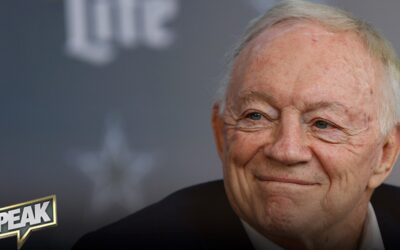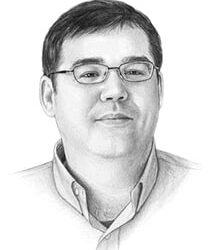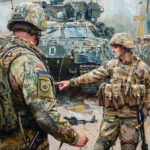‘Andor’ Is a Chilling Vision of Fascism and Resistance in a Galaxy Far, Far Away

‘Andor’ Is a Chilling Vision of Fascism and Resistance in a Galaxy Far, Far Away
The acclaimed “Star Wars” show is rooted in British political dramas.
Syril Karn, played by actor Kyle Soller, in a still from Season 2 of “Andor.” Lucasfilm
The Empire has always been British. Ever since the first Star Wars, the villains have had stereotypically upper-class British accents. (Darth Vader is the chief exception; actor David Prowse’s rural West Country accent was overdubbed with the rich tones of James Earl Jones.) Yet many of the good guys have also been British—unsurprising for a franchise that from the start was principally filmed in the United Kingdom and drew much of its original inspiration from World War II movies depicting heroic British pilots and commandos.
But the Disney+ show Andor, which begins its second (and final) season on Tuesday, frames a galaxy far, far away in an entirely different form of Britishness: the leftist political dramas made during the Margaret Thatcher years.
The Empire has always been British. Ever since the first Star Wars, the villains have had stereotypically upper-class British accents. (Darth Vader is the chief exception; actor David Prowse’s rural West Country accent was overdubbed with the rich tones of James Earl Jones.) Yet many of the good guys have also been British—unsurprising for a franchise that from the start was principally filmed in the United Kingdom and drew much of its original inspiration from World War II movies depicting heroic British pilots and commandos.
But the Disney+ show Andor, which begins its second (and final) season on Tuesday, frames a galaxy far, far away in an entirely different form of Britishness: the leftist political dramas made during the Margaret Thatcher years.
Andor is a political thriller about living under a fascist state—one built on casual brutality, quota-driven slave labor, the destruction of minority culture, and the needs of endless war. It’s a vision of the Empire as a genuinely terrifying force, not as faceless drones with terrible aim. Death is frequent and not clean: Characters are hanged, electrocuted, crushed by sliding cargo, and stabbed in back alleys.
The series traces the political evolution of its eponymous main character, portrayed by Diego Luna, who first played the character in 2016’s Rogue One. In Rogue One, by largely the same creative team, Cassian Andor is an experienced rebel operative; in Andor, which starts five years earlier, he begins as an apolitical thief before being drawn into the nascent rebellion.
But the resistance here isn’t made up of the cleanly heroic fighter pilots of the Star Wars movies. It’s frayed, paranoid, and morally compromised, ready to sacrifice its own soldiers to avoid blowing a key intelligence source or to provoke the Empire into murdering civilians to drive the cause forward. In a critical monologue, the rebel organizer (played by Stellan Skarsgaard) spells out the cost of the struggle: “I’m condemned to use the tools of my enemy to defeat them. I burn my decency for someone else’s future. I burn my life to make a sunrise that I know I’ll never see.”
It is both incredible and mildly ridiculous that this show exists in the same universe as lightsabers and Ewoks. A peculiar thing happens with franchises as gigantic as Star Wars and its fellow member of the Disney entertainment juggernaut, the Marvel Cinematic Universe: The sheer number of movies and shows allows unexpected experimentation with genre and theme. Marvel’s Captain America: The Winter Soldier was a 1970s-style conspiracy thriller, Black Panther tackled Black militancy and Afrofuturism, WandaVision was a metafictional passage through U.S. sitcom history. Star Wars’ The Mandalorian is a science-fiction Western, while The Acolyte is a detective story.
Andor is largely the creation of American writer and director Tony Gilroy, who has been involved with several fine thriller movies, such as Michael Clayton and the Bourne franchise. But rather than just drawing on these thrillers, the new series traces its influences to the tense, political British TV series and movies of the 1970s to 1990s.
It’s not just that the supporting cast is overwhelmingly British and Irish; the themes and style are deeply influenced by shows including the classic drama Edge of Darkness (1985), The Sandbaggers (1978-80), and Harry’s Game (1982). Those were marked by an intense focus on political oppression, the costs and ironies of espionage, and the tense state of the nation. It is very easy to imagine Andor screening on ITV in the 1980s—with roughly 2 percent of the budget and a quarter of the episodes.
British political drama was particularly shaped by both the Troubles in Northern Ireland and the 1984-85 miners’ strike. During the former, the violence was not confined to Belfast; the Irish Republican Army’s bombing campaign hit the British mainland repeatedly. There are still vanishingly few trash cans in British train stations, since they were removed for fear of explosives. Along with the violence came appalling miscarriages of justice by a police force that took an Irish accent as proof of guilt.
During the miners’ strike, meanwhile, the British state employed policing tactics honed in Northern Ireland and Hong Kong at home. Clashes between miners and police turned into full-blown battles. Police spies went deep undercover within radical groups, including having relationships and children with activists.
Both of these struggles inform Andor. The planet where the first season’s action starts and finishes, Ferrix, borrows its industrial culture from Britain’s mining towns—down to the role of a ceremonial colliery band. The uneasy occupation of Ferrix by imperial forces and street-level warnings of approaching troops are drawn from Belfast.
A key moment of tension in Andor turns, as often in Northern Ireland, on a parade and a funeral. A long prison riot sequence is inspired in part by In the Name of the Father (1993), a film about the Guildford Four, who were wrongly convicted of pub bombings in the 1970s. In a scene evocative of anti-colonial violence from Belfast to Gaza, a boy mourning a murdered father builds a bomb whose throwing will spark a riot and massacre.
The U.K. is not, of course, the only influence. There is a strong Latin American subcurrent, from Andor’s childhood among an Indigenous-coded village destroyed by mining to the scenes of broken torture victims in improvised secret police cells. There are visible influences from resistance films including The Battle of Algiers and Army of Shadows.
The show’s structure is also a far cry from the quest narrative of the Star Wars movies. Multiple plot strands are wound together in the fashion of a state-of-the-nation novel; a series of three-episode arcs focused around Andor himself is mixed with ongoing threads of domination and resistance that span social classes. There are dozens of characters; even small roles have a richness and realism to them.
As Senator Mon Mothma, Genevieve O’Reilly transforms a background character first encountered in Return of the Jedi (one of just four women with speaking roles in the first movies) into a woman feeling the walls close around her as she poses as a political irritant but secretly funds militants. O’Reilly has played the character in numerous other Star Wars works, but this is the first time she has been given the opportunity to show off what she can really do as an actor. Mon Mothma’s husband is a recognizably upper-class London type in the mold of Boris Johnson, complaining that her liberal causes, unlike his “fun” imperial friends, make everything so “boring and sad.”
Like the dystopian film Brazil or Alan Moore’s original V for Vendetta comic series, Andor spends plenty of time inside the bureaucracy of fascism. The Empire is vicious and petty—and overstretched, guarding its slave labor facilities with too few soldiers, building its own doom with needless cruelty. In one of the show’s finest ironies, Andor is arrested and imprisoned not for the heist of an imperial armory he’s just committed but for being in the wrong place at the wrong time when a local cop is in a bad mood and the Empire needs prison camp labor to build its weapons.
The show humanizes imperial agents, from rent-a-cops and prison guards to secret police, without forgiving them. It begins with the killing of two corporate enforcers, petty bullies trying to run a shakedown on Andor himself. In a regular adventure drama, their deaths would be a way to show the coolness of the action hero; here, one dies accidentally, and the other pleads desperately for his life before the protagonist shoots him in desperation.
When we first meet Denise Gough’s secret police officer, to take another example, she’s a clever and determined woman struggling with uncooperative colleagues and institutional sexism. But as we see, she’s also a sadistic torturer, and even her earlier achievements are recast when we come to realize what “exceeding quota” in her sector actually means.
The other chief imperial viewpoint character is Syril Karn, played by one of the rare American actors in the show, Kyle Soller, and a creation of genius. He is a go-getter deputy police inspector in a self-tailored uniform surrounded by colleagues who just want to eat noodles and finish their shifts; his storyline is simultaneously hilarious, pathetic, and menacing.
I don’t know what will happen in the second season of this incredible show, which is dropping in three-episode blocks over four weeks. The creators may not have expected a story of lawless fascism to be quite so relevant to a U.S. audience. We know the end of this story, both for the character of Andor and for the ultimate victory of the resistance. But we don’t know the costs paid on the way.
James Palmer is a deputy editor at Foreign Policy. X: @BeijingPalmer
More from Foreign Policy
-

An illustration shows a line of large shopping carts facing down a small Donald Trump figure holding two shopping bags. The stars of China’s flag are in the upper left corner. Why Beijing Thinks It Can Beat Trump
China’s elites have a new confidence in their own system.
-

U.S. Army Chief of Staff Randy George speaks to U.S. soldiers at the Hohenfels Training Area in southern Germany on Feb. 6. A Drawdown of U.S. Forces in Europe Is All but Certain
Here’s how the Pentagon can rebalance its approach to the continent without sacrificing U.S. interests.
-

University of California, Los Angeles students, researchers, and demonstrators rally during a “Kill the Cuts” protest against the Trump administration’s funding cuts on research, health, and higher education in Los Angeles on April 8. Why Authoritarians Attack Universities First
A Yale professor and expert on fascism talks about why he’s leaving the United States under Trump.
-

Dwight D. Eisenhower looks over a piece of paper while sitting on a couch as Robert Cutler looks over his shoulder. How Generations of Experts Built U.S. Power
And now Trump is throwing it all away.







Join the Conversation
Commenting on this and other recent articles is just one benefit of a Foreign Policy subscription.
Already a subscriber?
.
Subscribe
Subscribe
View Comments
Join the Conversation
Join the conversation on this and other recent Foreign Policy articles when you subscribe now.
Subscribe
Subscribe
Not your account?
View Comments
Join the Conversation
Please follow our comment guidelines, stay on topic, and be civil, courteous, and respectful of others’ beliefs.
Change your username |
Log out
Change your username:
CANCEL
Confirm your username to get started.
The default username below has been generated using the first name and last initial on your FP subscriber account. Usernames may be updated at any time and must not contain inappropriate or offensive language.